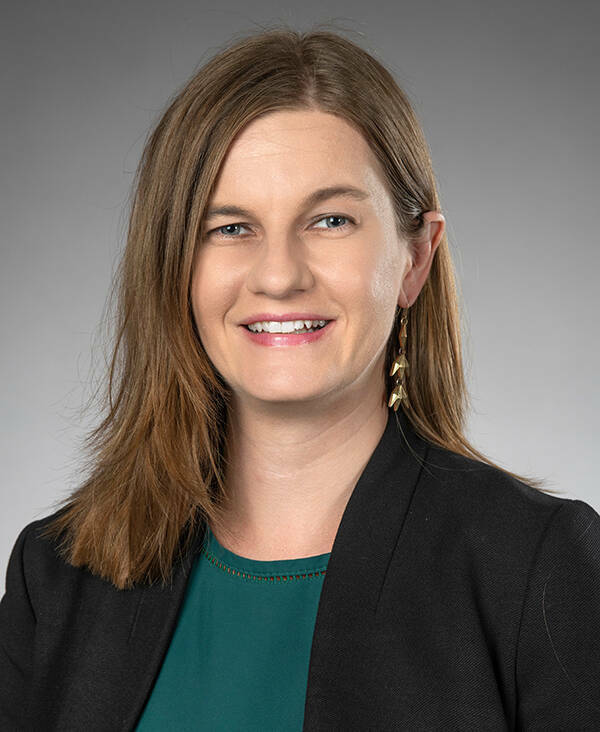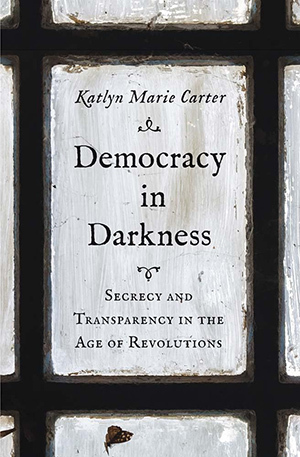Democracy in darkness: Notre Dame historian explores the role of secrecy in representative government

Most people would accept without scrutiny that secrecy poses a threat to modern democracies. In fact, the masthead of the Washington Post declares that “Democracy Dies in Darkness.”
However, for Katlyn Marie Carter, an assistant professor of history at the University of Notre Dame, that sentiment “obscures the odd truth that American democracy was in fact born in darkness.” Members of the Constitutional Convention, for example, not only met behind closed doors, but nailed windows shut and posted guards to protect against potential eavesdroppers.
There are lessons to be learned from democracy’s shadowy origins about both the dangers and potential utility of secrecy in a representative government, Carter said.
In new research, Carter explores how debates over secrecy and transparency in politics during the Age of Revolutions in the 18th century shaped modern democracy — and how they can shed new light on current examples of political misconduct from the mishandling of classified documents to the sending of emails over private servers.
“Often when we’re talking about what should be secret or transparent in government, the issue gets pulled out of historical context,” she said. “So, it’s important to remember that these debates aren’t entirely new. New technologies may change the scope and implications of them but, fundamentally, these are debates that have been going on since our government was established.”

Carter’s book, “Democracy in Darkness: Secrecy and Transparency in the Age of Revolutions” (Yale University Press, 2023), traces the trajectories of the American and French Revolutions as they embraced and eschewed secrecy to varying degrees and examines how representative democracy was shaped in the process.
“This moment in the late 18th century is really the origin of modern representative democracy,” she said. “Before this, representative government and democracy were seen as very different — even incompatible — things. So, part of the story I tell is how those two concepts came together to the point that today, we don’t even question that representative government is the main form of democracy in the modern world.”
Ironically, Carter wrote in the book, commitments to transparency in the governments born of revolution in America and France often resulted in losses of public trust and instability.
“When elected officials in the early United States and revolutionary France made claims to speak for the people, the use of secrecy actually strengthened those claims by deferring popular disagreements to after the promulgation of constitutions and the passage of laws rather than during the deliberative process,” she wrote.
The very meaning of democracy was changed in the process, she stated.
“By the end of the Age of Revolutions democracy meant something new: it was widely understood as a means by which the people ruled themselves through elected representatives, rather than a government necessarily characterized by the degree of popular participation in it.”
Carter also said that exploring the ways in which the French and U.S. governments grappled with issues of secrecy allows for a more nuanced comparison of the two revolutions.
“In the U.S., through the early leadership of George Washington, secrecy is used to create a particular style of representative politics that is a little more insulated,” she said. “And over time, things gradually open up more as we move toward the 19th century. In France, the trajectory is really the opposite. From the beginning, they’re very open and dedicated to the idea of publicity and transparency, not just rhetorically, but practically. They work on their constitution with open doors and big audiences. And it’s only gradually that they start to reintroduce more secrecy into their legislative processes.
“But in both cases, it’s a very central concept to how these governments are formed in ways that haven’t really been recognized.”
Moving into the late 20th and 21st centuries, Carter sees a marked popular disavowal of secrecy in government that, she argues, may overlook some of its potential benefits.
“I started this project from the vantage point that secrecy has often been used to shield elected officials from public opinion and pressure — and that that’s a bad thing,” she said. “And I ended it thinking, well, sometimes that is a bad thing. But at other times, it can have some utility when the better decision is not always the most popular one or the one being suggested by the loudest voices. So, it can serve a function, when used carefully.
“When we go back and investigate how democracy came to be, we see that it contains these kinds of contradictions and unresolved questions. But part of the challenge of keeping democracy going and keeping it vital is trying to confront those internal tensions and explore them in new ways.”
Latest Faculty & Staff
- In memoriam: Alasdair MacIntyre, the Rev. John A. O’Brien senior research professor of philosophy emeritusAlasdair MacIntyre, the Rev. John A. O’Brien senior research professor of philosophy emeritus and a permanent senior distinguished research fellow at the de Nicola Center for Ethics and Culture, died on May 21, 2025. He was 96.
- Santiago Schnell, dean of Notre Dame’s College of Science, appointed as provost of DartmouthSantiago Schnell, the William K. Warren Foundation Dean of the College of Science at the University of Notre Dame, has accepted an appointment as provost at Dartmouth College. He will depart Notre Dame at the end of June and begin his new role in July.
- Notre Dame’s Fightin’ Irish Battalion receives Department of Defense award as nation’s top Army ROTC programThe United States Department of Defense honored the University of Notre Dame’s Army ROTC Fightin’ Irish Battalion as the nation’s top Army collegiate program for the 2023-24 academic year. This will be the first time the unit has received the department’s Educational Institution Partnership Excellence Award, which recognizes the program’s achievements in recruiting, educating, training and commissioning leaders of character to be the next generation of military officers.
- In memoriam: Karl Ameriks, the McMahon-Hank Professor of Philosophy EmeritusKarl Ameriks, the McMahon-Hank Professor of Philosophy Emeritus at the University of Notre Dame, died on April 28 from pancreatic cancer. He was 77. Born in post-World War II Germany, Ameriks’ family emigrated to the United States when he was a child, and he grew up in Detroit, Michigan. He received his bachelor’s and doctoral degrees from Yale University. He came to the Department of Philosophy at Notre Dame in 1973 during a formative time for the department, which had transitioned from a predominantly Thomist focus to the more analytical American philosophy in the 1960s.
- Notre Dame psychologist explores how children best learn math — and yes, timed practice helpsUniversity of Notre Dame professor of psychology Nicole McNeil recently co-authored a report that examines the best way for children to learn arithmetic — whether that’s by memorizing number values and multiplication tables, or by studying math at a deeper, conceptual level. The report, “What the Science of Learning Teaches Us About Arithmetic Fluency,” was published in the journal Psychological Science in the Public Interest and shows that children learn most effectively when instruction follows an evidence‑based cycle: grounding facts in conceptual understanding, using brief timed practice to make those facts automatic, and then returning to discussion and reflection to deepen that knowledge.
- ’Tis the season for ticks and mosquitoes. A medical entomologist talks about these pests and how to avoid them.Notre Dame expert Lee Haines explains the risks mosquitoes and ticks pose to the Midwest and discusses how the public can best protect themselves and family members (including pets) from these bloodthirsty pests.












